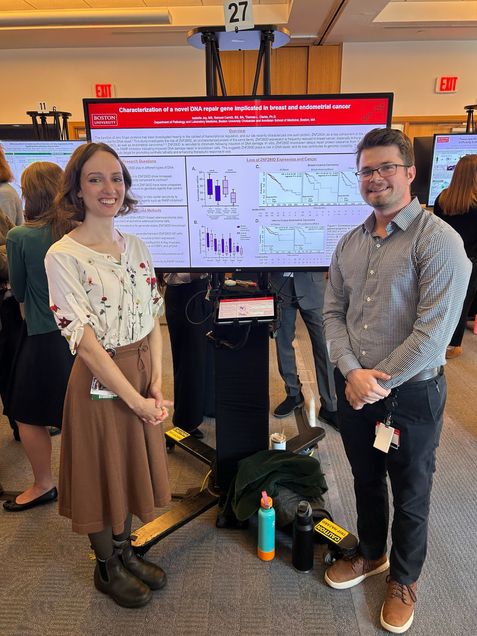Student Spotlight: Isabelle Joy ‘ 28 – 2025 DoM Evans Days 1st Place Basic Science Poster Winner

We want to congratulate Isabelle Joy, the 2025 Boston University Department of Medicine Research Symposium
1st Place Basic Science Poster Winner! Isabelle was a 2025 MSSRP student mentored by
Dr. Thomas Clarke and received support from The Grunebaum Cancer Research Foundation.
Isabelle
co-presented with my colleague Samuel Camilli, a master’s student in the Pathological Laboratory Sciences program in GMS. Isabelle and Samuel’s research is conducted in the Clarke Lab were also mentored by Zeeba Kamaliyan, the post doctoral research fellow. They noted both mentors were supportive mentors throughout this project, and they feel very fortunate to have great leaders to rely on for research that have not only been exciting and fulfilling, but also complex and challenging. They also received support from our fantastic PhD students Chris and Adrianna.Their study “Characterization of a novel DNA repair gene implicated in breast and endometrial cancer” investigates the role of the previouTsly uncharacterized gene ZNF280D in the DNA damage response, finding that its loss in breast and endometrial cancers correlates with poor prognosis. Experiments show that ZNF280D knockdown impairs DNA repair and sensitizes cancer cells to genotoxic agents including PARP inhibitors. Their results suggest that ZNF280D is a novel regulator of DNA repair and a potential therapeutic target to improve synthetic lethality-based treatments.
The field of DNA repair is integral to not only cellular health but also the health of every human. Isabelle and Samuel are both interested in understanding the fundamental mechanisms driving diseases like cancer, developmental delays, and neurodegenerative diseases. They were specifically interested in ZNF280D because it combines our shared fascination in molecular biology with their desire to address important clinical issues disproportionately affecting vulnerable populations.
They note the importance of this research aligns with the current paradigm in oncology centered on precision medicine. They go on to state, “Many of the frontline chemotherapeutic options for breast cancer, among others, like paclitaxel and cisplatin are poorly tolerated in patients because they target vital structures and processes in cells across the body. By investigating novel targets involved in DNA repair, our lab aims to exploit targets that can induce synthetic lethality in cancer cells: an approach exemplified by the clinical success of PARP inhibitors in BRCA null tumors. Identifying new synthetic lethal interactions could provide highly selective therapeutic strategies that spare normal cells, potentially reducing toxicity and overcoming resistance mechanisms. Ultimately, this research could contribute to more effective, safer, and personalized treatment options for patients with triple negative breast cancer.”
What Isabelle and Samuel have learned through this research experience:
Isabelle: I gained a great appreciation for the field of molecular biology through this research. The meticulous dedication that is required to confirm a hypothesis is far beyond what I imagined, and I learned that I love the experience of taking a deep dive into a question and disproving all of my own counterarguments until I have a theory that is backed by solid evidence and foolproof logic. The satisfaction from that aspect of the work was certainly a pleasant surprise. This was my first experience presenting my research in a formal setting, and I had an absolute blast doing it. I also grew more confident in public speaking, fueled by my sheer excitement in the research findings.
Sam: This experience has greatly improved my mentorship abilities. At first, I was super hands on with Isabelle, guiding her through protocols and slowly introducing techniques. Once she was in the full swing of the MSSRP Summer Program, she took off like a bottle rocket. From then on, I took a more passive approach, letting her come to me as questions arose. It was really great to watch Isabelle’s confidence grow throughout her time in the lab.
View all posts
 We want to congratulate Isabelle Joy, the 2025 Boston University Department of Medicine Research Symposium 1st Place Basic Science Poster Winner! Isabelle was a 2025 MSSRP student mentored by Dr. Thomas Clarke and received support from The Grunebaum Cancer Research Foundation.
We want to congratulate Isabelle Joy, the 2025 Boston University Department of Medicine Research Symposium 1st Place Basic Science Poster Winner! Isabelle was a 2025 MSSRP student mentored by Dr. Thomas Clarke and received support from The Grunebaum Cancer Research Foundation.